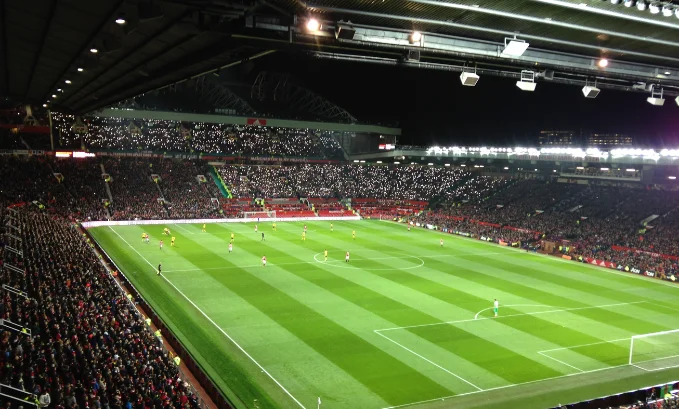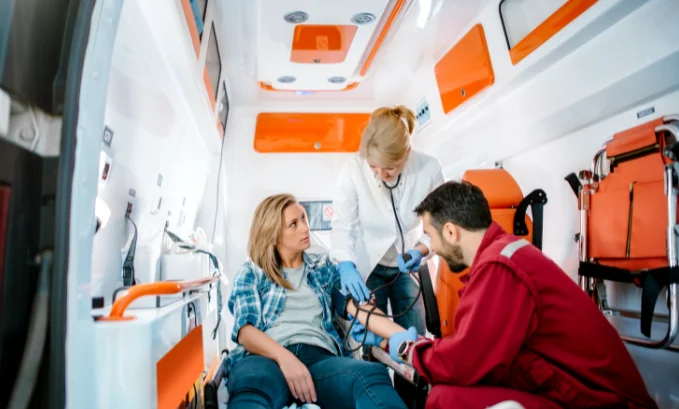Why do you need a football paramedic at your football event?
Why do you need a football paramedic at your event?

Having a football paramedic on the sidelines of an event is essential to ensure the safety and well-being of all football players. This person is responsible for providing immediate medical assistance in case of any injuries or health issues that may arise during gameplay. They are trained to assess injuries, provide first aid, and monitor the overall medical condition of footballers throughout the duration of their match.
A football paramedic needs to be able to rapidly recognize any signs and symptoms of injury, disease, or illness in football players. They must be knowledgeable about emergency response protocols and understand how to safely administer basic medical care while remaining calm in a stressful situation. Football paramedics need to be equipped with the right tools and materials to quickly deliver emergency treatment if needed. Most importantly, they must be aware of their own physical limitations and know when it is necessary to refer footballers for more advanced care from a qualified on-site physician or off-site hospital.
In addition, football paramedics are expected to help prevent football injuries by monitoring playing conditions and coaching practices closely. They can spot improper techniques that may increase players’ risk of injury, such as overuse or incorrect technique related to kicking, tackling and other football maneuvers. By proactively spotting potential risks before they become a problem, football paramedics can help make sure football events remain safe for everyone involved.
Having a qualified football paramedic on hand at any football event helps ensure that participants stay safe and have access to quick medical attention if needed. It also provides peace of mind for players, coaches, and spectators alike knowing that there is someone trained in emergency medicine who can respond quickly at any time if something goes wrong during gameplay. Ultimately this helps create an environment where all participants in an event – regardless of their level of experience – can enjoy competitive football without needing to worry about unnecessary risks associated with their safety.
What injuries occur during football competitions?
Football is a highly physical and demanding sport, which puts football players at risk for a variety of injuries. The most common football injuries are strains and sprains, concussions, dislocations, fractures, and contusions. Strains occur when a muscle or tendon becomes overly stretched or torn due to overuse or sudden movements such as changing direction quickly. Sprains occur when the ligaments that connect two bones are overstretched or torn. Concussions happen when the brain gets rattled inside the skull due to impact with another player or object, resulting in changes in mental alertness and physical functioning. Dislocations occur when two bones become separated due to extreme force or twisting of a body part. Fractures result from broken bones and can be caused by direct contact with another player or object, as well as overuse of a bone like frequent running on hard surfaces without proper footwear support. Lastly, contusions happen when capillaries beneath the skin rupture due to direct contact with another player’s body part but don’t break through the skin’s surface.
Football paramedics are trained medical professionals who evaluate football players on the field for physical injury during football competitions and provide emergency medical services if needed. Common football-related injuries that football paramedics encounter include head trauma from helmet-to-helmet hits; shoulder dislocations resulting from an excessive hit; leg fractures from getting stepped on during a tackle; ankle sprains from sudden cutting motions; knee ligament tears stemming from sharp turns; hamstring pulls triggered by an overextension of muscles; groin strains caused by aggressive kickoffs; hip contusions resulting from falls onto rough surfaces; lower back pain brought on by repetitive strain; and even concussions caused by high-velocity impacts with other players or objects like goal posts.
These football-specific injuries can be treated quickly and effectively in many cases by football paramedics using techniques such as splinting fractured limbs for transport, applying ice packs for swelling reduction and temporary pain relief, administering anti-inflammatory medications for muscle spasms, providing oxygen therapy for breathing difficulties, wrapping wounds tightly with bandages to stop bleeding, performing CPR if needed after a traumatic event like cardiac arrest or shock occurs on the field, assessing conscious level changes following head trauma incidents in order to determine further treatment needs such as hospitalization versus prescription medications only at home care instructions given out at discharge time.
Why do football events need paramedics?

Football is a sport that can be incredibly dangerous and intense for players, both professionally and recreationally. As such, football events require the presence of paramedics to ensure the safety of players and attendees alike. Paramedics not only provide quick medical attention in case of an emergency, but they may also assist with pre-game or halftime check-ups on players to help identify any potential health issues that may arise during the course of a football match.
Additionally, paramedics are equipped with an array of first aid supplies to treat injuries sustained during football matches or other football-related events.
In addition to attending football matches, paramedics are available at football training sessions to provide medical advice and treatments if needed. During football practices, physical contact between players often leads to minor sprains and bruises as well as more serious injuries. In order to ensure the safety of players during such activities, football clubs usually have paramedics on site who are able to respond quickly and efficiently in case of an accident or injury.
As football is becoming increasingly popular across all levels from recreational leagues up to international teams, more and more football clubs require paramedics on their premises. Football referees also depend on paramedics for support when making decisions about player’s safety on the pitch; since they don’t have any formal medical qualifications it is important for them to receive professional guidance from experienced paramedics in order make sure that their decisions are based on sound medical advice.
The presence of first responders at football events helps ensure that any incidents resulting in injury are responded quickly and properly treated by trained professionals. The presence of paramedics at football matches serves as a reassurance for all those involved in the game – from fans watching from the stands, through to coaches in charge of teams – as everyone can be safe in the knowledge that help is available if needed.
What does a paramedic do for a football?
A football paramedic is an integral part of football. Their role is to provide medical treatment and assistance if someone gets injured in a football game or practice. Football paramedics must be highly trained and able to assess injuries, provide first aid, administer medication, perform emergency actions such as CPR or defibrillation, transport patients, and communicate with other medical staff for any football-related events.
Football paramedics must be prepared for any situation that may arise during the course of a football match or practice session. They must be knowledgeable about all aspects of football-related injury prevention and management. Football paramedics should possess knowledge of anatomy and physiology, basic first aid skills such as wound care and bandaging techniques, cardiopulmonary resuscitation (CPR) techniques, advanced life support medications including intravenous fluids, oxygen therapy and defibrillation as well as the ability to recognize signs of heat exhaustion or dehydration.

Safety is always a priority for football paramedics. Therefore they must also have the necessary equipment with them at all times such as portable monitors to check vital signs, splints and airway maintenance devices such as laryngoscopes and endotracheal tubes in case of emergency intubation is needed. As football often involves high levels of physical contact between players that can lead to more serious injuries such as concussions or spinal cord injuries, football paramedics are expected to be well-versed in how to handle these types of injuries appropriately by assessing the situation quickly yet thoroughly so that correct action can be taken if needed.
In addition to providing medical treatment onsite during football activities or matches, football paramedics are also responsible for post-match care by completing reports detailing any injuries sustained during the match along with recommended follow up treatments.
It is important that football paramedics have good communication skills too so they can liaise effectively between players/coaches/medical staff when needed. In summary, football paramedics are invaluable members of football teams who play a key role in ensuring everyone remains safe on the field through their expertise in injury prevention and quick action when an injury does occur.